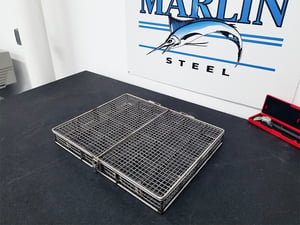 Choosing the right type of stainless steel for your manufacturing application can be tough. There are numerous stainless steel grades to choose from—such as grade 304 stainless steel, grade 430 stainless steel, or grade 420 stainless steel (which are, in order, examples of austenitic, ferritic, and martensitic stainless steel alloys). Considering that there are thousands of types of stainless steel, how can you choose the right alloy to meet your needs?
Choosing the right type of stainless steel for your manufacturing application can be tough. There are numerous stainless steel grades to choose from—such as grade 304 stainless steel, grade 430 stainless steel, or grade 420 stainless steel (which are, in order, examples of austenitic, ferritic, and martensitic stainless steel alloys). Considering that there are thousands of types of stainless steel, how can you choose the right alloy to meet your needs?
Here are a few tips for choosing between different stainless steel grades that Marlin’s own engineering team often use when designing a custom wire basket.
Sorting Types of Stainless Steel Based on Process Temperatures
While most varieties of stainless steel have a fairly high melting point, this point varies from one type of stainless steel to the next. Additionally, some stainless steel grades better resist scaling and oxidation than other varieties at high temperatures.
So, sorting your stainless steel choices based on their maximum use temperature and/or melting point makes for an easy pass/fail test for your manufacturing process. If the steel can’t take the temperatures used in your process, then you should skip it. This is most often useful for heat treatment or temperature-based sterilization processes, as these heat-intensive processes are more likely to push the limits of a stainless steel alloy’s temperature tolerance.
Check the Corrosion Resistance of Each Stainless Steel Grade You Consider
Part of the reason why many manufacturers prefer stainless steel is that it resists corrosion and oxidation—making it easier to keep clean and sterile than plain steel. However, not every grade of stainless steel resists the same corrosives. Some types of stainless steel are better at resisting certain types of acidic compounds, some are less susceptible to pitting from exposure to salt, and some are resistant to a wide variety of corrosive compounds.
It can be difficult to generalize about the corrosion resistance of different types of stainless steel. However, austenitic stainless steels, such as grade 304 or 316 stainless steel, tend to have better overall corrosion resistance than other types of stainless steel. This is because austenitic stainless steels have a higher chromium content, which helps improve general corrosion resistance (though it doesn’t always guarantee better resistance to every corrosive).
It’s important to check with a steel manufacturer to get their specifications on what corrosives their steel alloys can resist and compare that to the specific corrosives that are used in your manufacturing process.
Consider How Much Weight the Final Product Will Hold
How “heavy-duty” is the process you’re considering? Does the stainless steel form need to hold a large amount of weight, or will it be used to contain small, lightweight parts? When choosing a grade of stainless steel for a custom wire or sheet metal form, it’s important to consider how the tensile strength of the material compares to the stresses it will be exposed to.
While most forms of stainless steel have a fairly high tensile strength—especially compared to plastic—there are a few stainless steel alloys that stand head and shoulders above others.
One example of a stainless steel alloy that has an extremely high tensile strength is grade 420 stainless steel that has been hardened and stress relieved. Normally, grade 420 stainless steel has a tensile strength of around 586 MPa—high, but not higher than grade 304 stainless steel (621 MPa). However, when hardened and stress relieved, grade 420 stainless steel has a tensile strength of 1,586 MPa, nearly three times as strong as it is when annealed.
Stainless steel grades that have a high tensile strength tend to be a better fit for heavy-duty applications that involve heavy loads—or allow baskets carrying lighter loads to be made with thinner wires. This can improve the open space of a basket with a tight wire mesh.
None of these characteristics should be considered alone. By checking all three factors listed above, you can narrow down your selection of stainless steel grades to the few that will provide the best performance for your custom fabrication solution.
Need help choosing between different stainless steel grades for a custom wire basket? Reach out to Marlin Steel to get started.



.gif)


